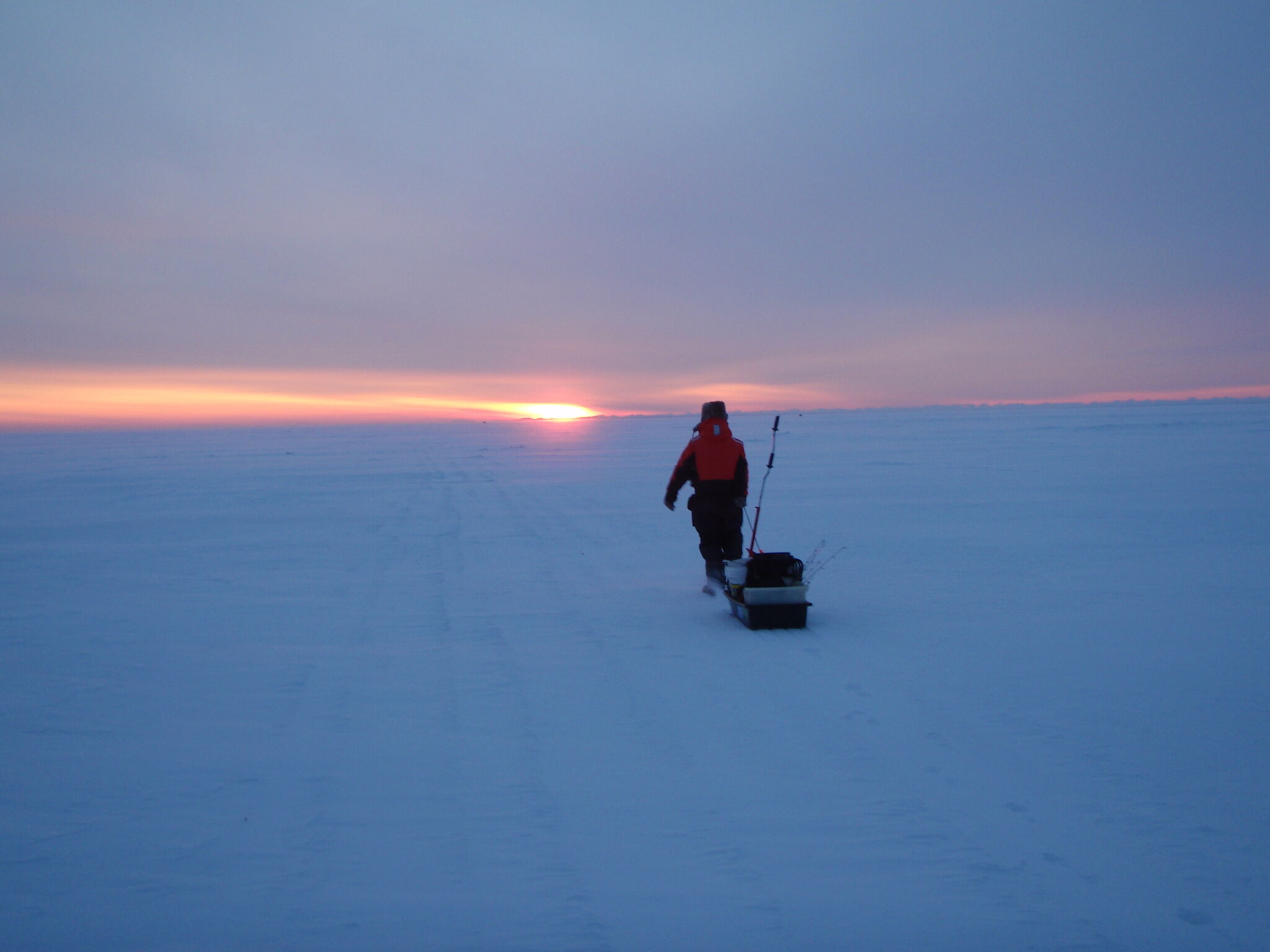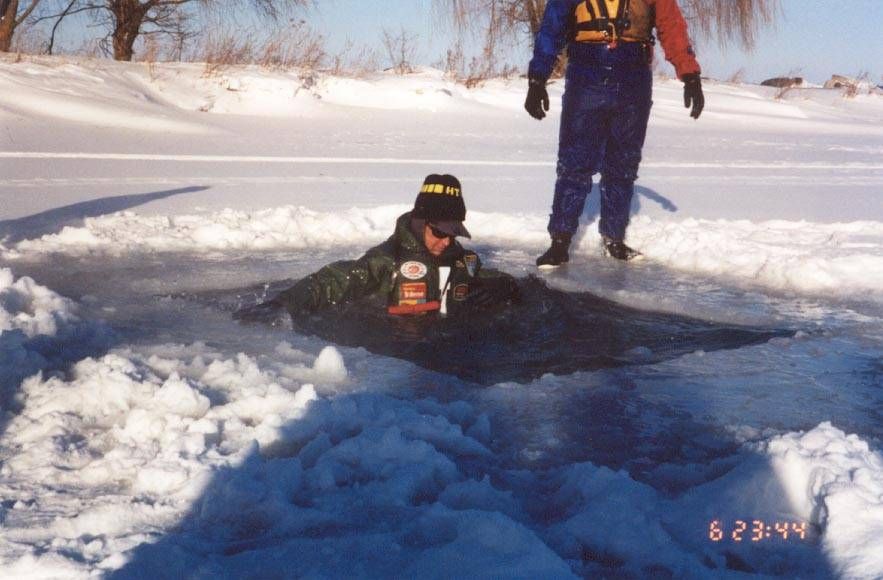
By guest writer Wil Wegman
Whether I am fishing a summertime bass tournament out of Orillia on calm or rough waters, swimming four kilometres across Lake Couchiching during the annual Sun City Swim event or kick-sledding all over its hard waters in search of jumbo perch thru the ice, I have nothing but respect and admiration for these mighty fish-filled waters. The sport of Ice Fishing in our region is one of the safest wintertime outdoor activities there is – with far fewer injuries or fatalities than downhill skiing at nearby ski resorts. Ice Fishing can be an inexpensive and rewarding experience for those who enjoy the great outdoors but of course a little preparation, research and focus on safety can help ensure a successful outing. So before venturing out onto the open ice on Simcoe, Couchiching or any of the fine lakes in or within casting distance of Orillia & Lake Country, we would like to help you stay on top … and stay safe this winter. Here are our on ice safety messages we’d like you to keep in mind.
Scoping Out Safe Ice Before You Set Foot On It:

Cars going through ice on Lake Simcoe
Local ice hut operators or tackle and bait shops are the experts to contact to find out about local conditions. Various online fishing forums and social media pages have also become popular as a primary source for ice conditions. Responsible sources like the Lake Simcoe Message Board for instance allow their highly respected spokesperson John Whyte to host up-to-date video clips that often utilize drones to show hazards and on-ice thickness/quality tests. This is far more responsible than someone using a pseudonym posting Lake X is safe to fish. Additionally, beginning in 2022 an innovative new App called Ice Time is also available which utilizes the latest satellite and radar imagery to highlight ice conditions and hazards like pressure cracks on our area lakes. The bottom line however is that you are responsible for your own safety!
Tell a Friend & Come Prepared:
Most importantly, before you go, regardless of when or where you are ice fishing, always let someone know the destination of your fishing area, the spot you are accessing the lake and when you plan on returning home. As well as your trusty GPS, It also helps to carry a compass, and know how to use it should your batteries fail and a snowstorm leave you guessing which way shore is. Been there, done that – so don’t leave shore without a trusty compass. Most importantly always carry a set of ice picks with you and have them readily accessible via a draw string around your neck or in an upper arm pocket of your coat. I have tried several brands over the years, and the ones by HT with retractable picks that don’t jab or poke you in transit, are my favorite. I look at carrying ice picks as inexpensive insurance that you never want to cash in on, but great to have at the ready if ya gotta! Carrying ice picks is like wearing your seat belt … you don’t ever want to have to rely on either to save your life … but just in case- each of them can and will!
Walking On Hard Water:

Example of a pressure crack on Lake Simcoe
Ice never freezes uniformly so testing it with a spud bar or auger frequently when unsure is standard practice on your way out. I like HT’s heavy duty Siberian spud bar that will chomp through ice lickety split. As a rule, at the start of the season, ice will be of highest quality and thickest near shore but the further you walk out the thinner it will become; so test often. When there’s glare ice HT’s ice safety treads slide over your boots easily and will help you stay upright and avoid nasty falls. If you’re fishing new lakes or even new sections of lakes you may not know conditions that well so test as you go! Try to identify and avoid any safety hazards like pressure cracks, air bubblers, river mouths, springs or currents- like those often seen in neck-down areas of Couchiching .

As a general guideline, four inches of clear blue or black ice is required for a person on foot. Anglers should still spread out however and be extra cautious because they might find that magic four inches in one location … but only two, somewhere else. Find at least six –eight inches of good clear blue/black ice for a snowmobile or ATV. Double the thickness if any ice that is white or opaque to equal the strength of the blue/black ice. Later in the season, ice can become soft or even honeycombed or candled and should be avoided. Additionally, that ice near shore, especially on northern shorelines where intense late winter sun can take its toll, can be troublesome … so be aware. Heavily used on-ice access spots are also problematic. Every late winter we can be fishing on over two or three feet of real good ice far from shore but those shoreline spots can be nothing short of treacherous so always have an alternate site to get off somewhere other than your primary access site at the start of the day.

When good ice conditions are present, traveling and ice fishing on frozen water can be extremely safe and enjoyable. In a lot of respects, ice safety is just a matter of common sense. Rest assured that going through is almost always preventable and prevention is always your main goal. Ultimately, learning as much as you can about this topic and experiencing different conditions on different lakes, at different periods during the winter will help you become more confident in your abilities to develop a healthy respect and understanding of the ice that is keeping you from becoming intimate with all that icy cold water and of course the wonderful fish beneath you.
Here’s to a wonderful and safe ice fishing season for everyone visiting Orillia & Lake Country this winter!
Wil Wegman is an award winning outdoor writer whose fishing articles have appeared in most Canadian and several US Outdoor magazines. Unless it’s a covid year, Wil’s ice fishing seminars see him present to large crowds across the province and on into nearby states. Wil’s day job means he has taken several on ice safety training courses and includes safety precautions in all of his seminars. In 2017 Wil was inducted into the Canadian Angler Hall of Fame and won the National Recreational Fisheries Award and the Rick Morgan Professional Conservation Award. He can be reached at his Focus on Fishing site at www.wilwegman.com
–
Extend your visit by booking an overnight stay in Orillia
LEARN MORE
Stay up-to-date, connect with us!
Facebook –> @OrilliaLakeCountry
Instagram –> @OrilliaLakeCountry
Twitter –> @OrilliaLakeCo


